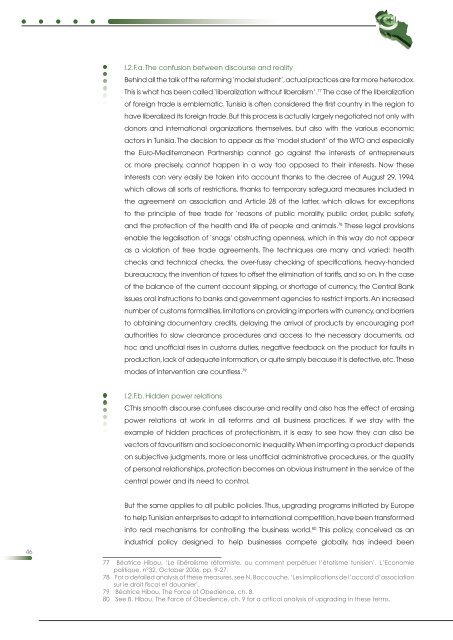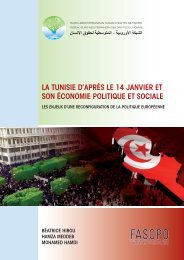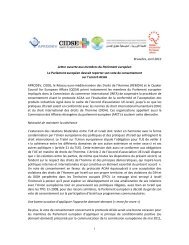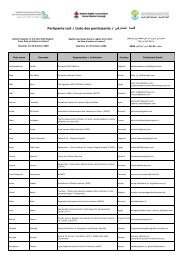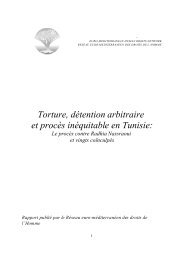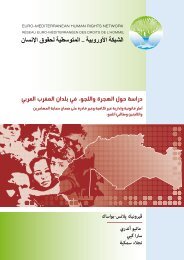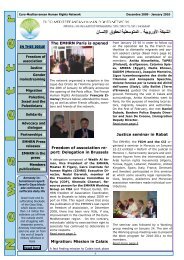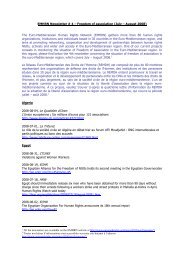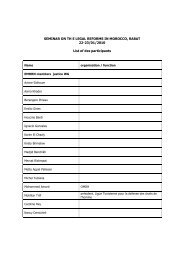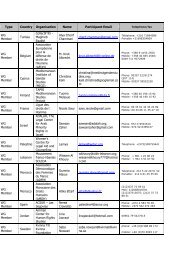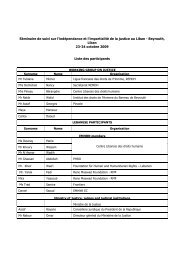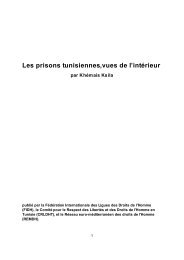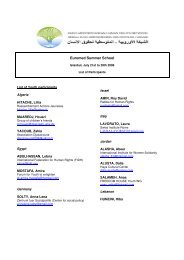tunisia after 14 january and its social and political economy - Refworld
tunisia after 14 january and its social and political economy - Refworld
tunisia after 14 january and its social and political economy - Refworld
You also want an ePaper? Increase the reach of your titles
YUMPU automatically turns print PDFs into web optimized ePapers that Google loves.
I.2.F.a. The confusion between discourse <strong>and</strong> realityBehind all the talk of the reforming ‘model student’, actual practices are far more heterodox.This is what has been called ‘liberalization without liberalism’. 77 The case of the liberalizationof foreign trade is emblematic. Tunisia is often considered the first country in the region tohave liberalized <strong>its</strong> foreign trade. But this process is actually largely negotiated not only withdonors <strong>and</strong> international organizations themselves, but also with the various economicactors in Tunisia. The decision to appear as the ‘model student’ of the WTO <strong>and</strong> especiallythe Euro-Mediterranean Partnership cannot go against the interests of entrepreneursor, more precisely, cannot happen in a way too opposed to their interests. Now theseinterests can very easily be taken into account thanks to the decree of August 29, 1994,which allows all sorts of restrictions, thanks to temporary safeguard measures included inthe agreement on association <strong>and</strong> Article 28 of the latter, which allows for exceptionsto the principle of free trade for ‘reasons of public morality, public order, public safety,<strong>and</strong> the protection of the health <strong>and</strong> life of people <strong>and</strong> animals. 78 These legal provisionsenable the legalisation of ‘snags’ obstructing openness, which in this way do not appearas a violation of free trade agreements. The techniques are many <strong>and</strong> varied: healthchecks <strong>and</strong> technical checks, the over-fussy checking of specifications, heavy-h<strong>and</strong>edbureaucracy, the invention of taxes to offset the elimination of tariffs, <strong>and</strong> so on. In the caseof the balance of the current account slipping, or shortage of currency, the Central Bankissues oral instructions to banks <strong>and</strong> government agencies to restrict imports. An increasednumber of customs formalities, limitations on providing importers with currency, <strong>and</strong> barriersto obtaining documentary cred<strong>its</strong>, delaying the arrival of products by encouraging portauthorities to slow clearance procedures <strong>and</strong> access to the necessary documents, adhoc <strong>and</strong> unofficial rises in customs duties, negative feedback on the product for faults inproduction, lack of adequate information, or quite simply because it is defective, etc. Thesemodes of intervention are countless. 79I.2.F.b. Hidden power relationsCThis smooth discourse confuses discourse <strong>and</strong> reality <strong>and</strong> also has the effect of erasingpower relations at work in all reforms <strong>and</strong> all business practices. If we stay with theexample of hidden practices of protectionism, it is easy to see how they can also bevectors of favouritism <strong>and</strong> socioeconomic inequality. When importing a product dependson subjective judgments, more or less unofficial administrative procedures, or the qualityof personal relationships, protection becomes an obvious instrument in the service of thecentral power <strong>and</strong> <strong>its</strong> need to control.46But the same applies to all public policies. Thus, upgrading programs initiated by Europeto help Tunisian enterprises to adapt to international competition, have been transformedinto real mechanisms for controlling the business world. 80 This policy, conceived as anindustrial policy designed to help businesses compete globally, has indeed been77 Béatrice Hibou, ‘Le libéralisme réformiste, ou comment perpétuer l’étatisme tunisien’, L’Economiepolitique, n°32, October 2006, pp. 9-27.78 For a detailed analysis of these measures, see N. Baccouche, ‘Les implications de l’accord d’associationsur le droit fiscal et douanier’.79 Béatrice Hibou, The Force of Obedience, ch. 8.80 See B. Hibou, The Force of Obedience, ch. 9 for a critical analysis of upgrading in these terms.


